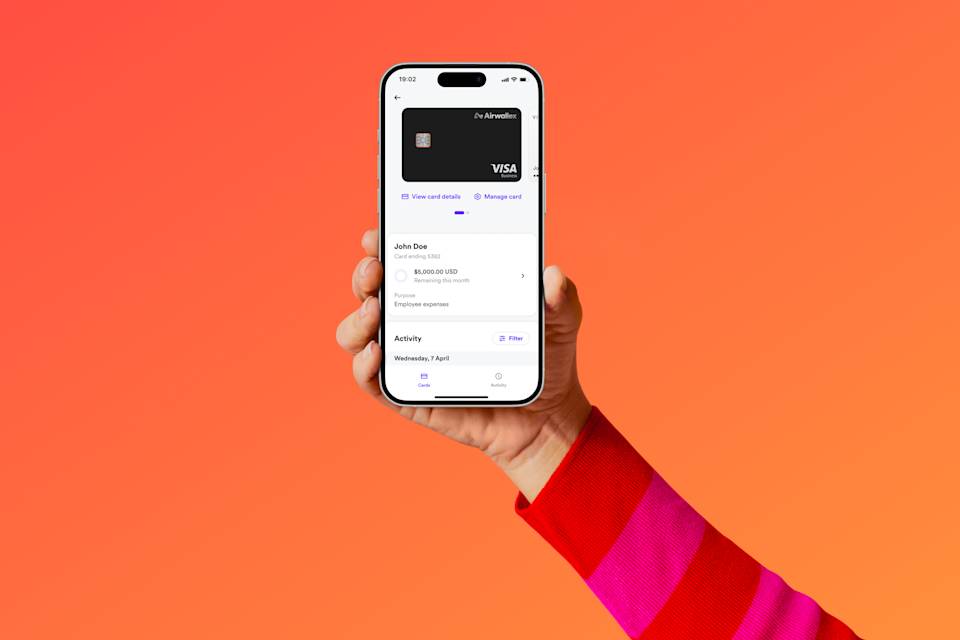Bank charges in the US and 4 ways to reduce them

Airwallex Editorial Team

Key takeaways:
Common business bank charges in the US include monthly maintenance fees, transaction fees, foreign exchange (FX) markups, and sometimes minimum balance penalties.
Fee structures vary widely depending on the bank and the type of business account.
To reduce or avoid fees, consider a modern financial platform that unifies your accounts, leverages local payment rails, and provides competitive exchange rates.
A business bank account is the financial backbone of your company, enabling you to send, receive, and manage money efficiently. But depending on your bank and account type, you may face a variety of charges – like monthly fees, transaction costs, minimum balance penalties, and foreign exchange (FX) fees.
Understanding these charges can help you avoid unnecessary costs that chip away at your margins. In this guide, we’ll break down the most common business bank fees in the US, compare offerings from leading providers, and share tips on how to reduce or eliminate avoidable charges.
What are bank charges?
Bank charges are the fees associated with using financial services, such as opening a business bank account, making transfers, and accepting payments. These fees can impact your overall costs, including payroll and supplier payments, as well as international transactions. When comparing business bank accounts, it's important to review the fee schedule and fine print, particularly clauses regarding free domestic transfers or fee waivers.
Banks often structure fees based on account type and transaction volume. If you’re running a small business with a lower transaction volume, you’ll likely have simpler fees. However, if you operate at scale or across borders, you may incur higher costs due to increased operational demands and complex services.
Different types of bank charges
Here are some standard bank charges you might encounter across banks in the US:
Account setup fees
Account setup fees are a one-time charge imposed by banks when you open a new account. These fees cover the administrative costs of processing your application. Some banks may require a minimum deposit upfront to open the account and ensure a baseline balance.
While most major banks in the US don’t charge a one-time setup fee to open a business account, they may require a minimum initial deposit or an ongoing balance to avoid monthly fees. Some banks may waive this requirement for small and medium-sized enterprises (SMEs) or new customers.
Monthly account fees
Monthly account fees, also known as maintenance or service fees, are recurring charges for maintaining an open business account. They typically range from $10 to $50 per month, depending on the bank and the type of account. These fees usually cover services such as account monitoring, statement preparation, and customer support.
Some banks, like Chase or Bank of America, may waive monthly fees if you maintain a minimum daily balance or enroll in bundled business services.
Minimum balance requirement and fall-below fees
Many business accounts require a minimum balance to avoid additional charges. If your account balance dips below the required threshold, you may be charged a fall-below fee (also called a balance shortfall fee).
For instance, if your bank requires a daily minimum balance of $5,000 and your average drops below that during a billing cycle, you could incur a monthly penalty.
Transaction fees
Transaction fees apply when you send or receive money from other accounts. Some banks include a limited number of free domestic transactions each month – such as ACH transfers, wires, or debit card purchases – but may charge a fee once that limit is exceeded.
For example, some Wells Fargo business checking accounts include up to 250 free transactions per month, then charge $0.50 per transaction thereafter.1
Cross-border fees
When sending or receiving international payments, banks typically charge cross-border fees that can include wire transfer costs, SWIFT network fees, intermediary bank fees, and currency conversion charges.
For example, many US banks charge $30–$50 for outgoing international wires, depending on the destination and delivery speed. These fees don’t usually include FX markups, which may be charged separately.
Foreign exchange (FX) fees
This markup is often embedded in the exchange rate itself, making it hard to spot but still impactful, especially for frequent international transactions.
Let’s say you’re converting USD to EUR and your bank applies a 2.5% FX spread. That could significantly increase the total cost of your transfer over time.
Overdraft and non-sufficient funds (NSF) fees
If you overdraw your account, your bank may allow the transaction to proceed and charge an overdraft fee, typically $30 to $35 per item. If a payment is declined due to insufficient funds, you may be charged an NSF fee instead.
Most banks require you to opt into overdraft protection to cover shortfalls. The exact fee and terms vary depending on the bank and your account agreement.
Inactivity and dormancy fees
Some banks charge inactivity or dormancy fees on business accounts that haven’t had any activity for a set period, often 12 months or more. These fees cover the cost of maintaining an unused account and can usually be avoided by making at least one deposit or transaction per billing cycle.
Comparing bank charges in the US
Let’s compare the typical charges you may encounter from leading US banks: Chase, Bank of America, Wells Fargo, Citibank, and US Bank. We’ve also included our Business Account as a fintech alternative to these traditional business bank accounts.
The table below compares the fees incurred for the lowest-cost business accounts for each bank against those incurred for the Airwallex Business Account.
Fee type | Airwallex Business Account | Chase Business Complete Banking² | Wells Fargo Initiate Business Checking3 | Bank of America Advantage Fundamentals4 | CitiBusiness Flexible Checking5 | U.S. Bank – Silver Business Checking6 |
|---|---|---|---|---|---|---|
Account setup fees | No fee | No fee | No fee | No fee | No fee | No fee |
Minimum initial deposit | None required | None required | $25 | $100 | None explicitly listed in fee schedule | $100 |
Monthly account fees | No fees with our Explore plan
| $0-$15 (waivable with minimum monthly balance) | $10 (waived with $500 min daily balance) | $0 first 12 mos, then $16 (waived with $5,000 balance or $500 debit) | $20–30 (depending on location; waived with $10,000 avg balance) | $0 |
Minimum balance requirement
| No min. balance requirement | Not required; $2,000 daily to waive monthly fee | Not required; $500 daily to waive monthly fee | Not required; $5,000 daily to waive monthly fee | Not required; $10,000 average daily to waive monthly fee | $0 – no monthly fee for any balance |
Free domestic transfers per month | Unlimited ACH/EFT | 20 free in-branch checks/deposits; unlimited ATM/ACH/debit | 100 free transactions | 20 free transactions | 500 free transactions | 125 free transactions |
Domestic transfer fee | No fee | $0.40 per item over limit | $0.50 per item over limit | $0.45 per item over limit | $0.45 per item over limit | $0.50 per transaction over limit |
International transfer fees | No fee (via local rails) | $40-$50 (USD); $5 FX online under $5,000, $0 FX online over $5,000 | $25 per online wire, $40 per in-branch wire (both USD & FX) | $15 incoming; $45 outgoing (USD); $0 outgoing (FX) with markup included in exchange rate | $15 incoming, $27 outgoing (FX) online, $65 outgoing (FX) in branch | $16 incoming; $75 outgoing |
4 ways to reduce bank charges
Bank charges can quietly erode your margin, especially if you make frequent cross-border transfers. Here are four strategies to help you reduce these charges:
1. Open a business account with low or no monthly fees
The right business account aligns with your business needs and transaction volumes. Look for an account that has no setup fees, low or no monthly fees, or one that waives fees if you meet certain conditions, such as maintaining a minimum daily balance. If your business processes a high number of transfers each month, consider negotiating with your provider for custom rates or bundled services to reduce per-transaction charges.
2. Consolidate your accounts with a single provider
Managing multiple accounts across providers means more admin work and higher fees. Consolidating your accounts with a single provider can help you reduce duplicate effort and fees. If you’re operating across the US as well as other regions, streamlining your accounts into a single platform like Airwallex enables you to simplify your financial operations and gain a consolidated view of your finances globally, while keeping costs low.
3. Use local payment rails instead of SWIFT
Banks typically use wire transfers or the SWIFT network for international transfers, which often incur high transaction fees and intermediary charges. To avoid these charges, choose a provider that uses local payment rails. Airwallex’s proprietary network of local payment rails enables you to send money to over 120 countries at no cost, as if it were a local transfer (e.g., sending USD to a supplier in the US).
4. Access competitive FX rates to reduce conversion costs
Most banks charge a 2–3% FX markup above the mid-market rate when converting currencies for international transfers, typically in addition to transfer fees. To reduce FX fees, work with a provider that offers interbank rates with a small, transparent margin. When you get competitive rates and full visibility into what you’re paying, you get to keep more of your money when converting and sending across currencies.
Keep your costs in check and save more on each dollar you earn
The right business account can save you from the hassle of constant monitoring and help you avoid unnecessary bank charges. Our Business Account lets you do just that. With no setup fees, monthly charges, or minimum balance requirements, you can focus on your business without worrying about these administrative costs.
With our multi-currency Wallet, you can receive, hold, and transfer funds on one platform. No more managing separate entities and incurring additional maintenance fees. And when you need to convert currencies, you can do so at interbank rates with a small, transparent markup of 0.5–1%, ensuring you keep more of your money.
With Airwallex, you can make high-speed international transfers to over 200 countries, leveraging 120+ local payment rails. 95% of our transfers are settled within a day, providing you with greater certainty over your cash flow.
Our platform offers integration with accounting software like QuickBooks and Xero, automatically categorizing and tracking transactions for you. This integration streamlines your monthly reconciliation, enabling you to stay on top of transaction fees and manage your cash flow more efficiently.
We simplify payments and keep costs low so you can focus on growing your business. That’s why over 150,000 businesses trust us to process more than $150 billion in payments annually.
Frequently asked questions
What are the most common hidden bank charges that businesses overlook?
Businesses often overlook hidden fees, such as minimum balance penalties, excess transaction fees, foreign exchange markups, and wire transfer charges, particularly for international payments. These fees may seem minor individually, but can add up significantly over time.
How can I negotiate bank fees with banks?
Banks are often willing to waive or reduce fees for customers who maintain strong balances or use multiple services. Come prepared with comparisons from other financial institutions and clearly state what you're looking for – whether it's waived monthly fees, reduced wire transfer costs, or custom pricing.
Are there any banks in the US that offer zero-fee business accounts?
Yes, several US banks and fintech providers offer business checking accounts with no monthly maintenance fees, especially for companies that meet certain balance or activity thresholds. However, fees for transactions, wires, or cash deposits may still apply, so it’s essential to review the full fee schedule before choosing an account.
How often should businesses review their bank statements to identify unnecessary charges?
Businesses should review their bank statements and transaction history at least monthly. Regular reviews can help catch unexpected fees, errors, or signs of fraud early – allowing you to take corrective action quickly.
Are there specific tools that help businesses track and monitor bank fees effectively?
Yes. Many banks and fintech platforms offer dashboards and alerts that help businesses monitor balances, track fees, and avoid overdrafts or insufficient funds charges. Third-party bookkeeping and expense management tools can also flag unusual or recurring charges.
Do all banks in the US charge the same fees for business accounts?
No. Fee structures vary widely across banks and account types. Some charge monthly fees or per-item transaction costs, while others offer bundled or unlimited plans. Comparing both traditional banks and modern fintech options can help you find the most cost-effective fit for your business.
Sources
https://www.wellsfargo.com/biz/checking/navigate/
https://www.chase.com/content/dam/chase-ux/documents/personal/checking/biz-how-your-transaction-will-work.pdf
https://www08.wellsfargomedia.com/assets/pdf/small-business/checking/initiate.pdf
https://www.bankofamerica.com/smallbusiness/deposits/business-advantage-banking/Business_Advantage_Fundamentals_Banking_Clarity_Statement_ADA.pdf
https://online.citi.com/JRS/popups/G108_CitiBusiness_Schedule_Fees_Charges_CA-NV_ADA.pdf
https://www.usbank.com/dam/documents/pdf/business-banking/business-pricing-information/deposit-products.pdf
Disclaimer: We wrote this article in Q2 2025. The information was based on our own online research, and we were not able to manually test each tool or provider. The information is provided for educational purposes only, and readers should consider their business's specific requirements when evaluating providers. If you would like to request an update, feel free to contact us at [email protected].

Airwallex Editorial Team
Airwallex’s Editorial Team is a global collective of business finance and fintech writers based in Australia, Asia, North America, and Europe. With deep expertise spanning finance, technology, payments, startups, and SMEs, the team collaborates closely with experts, including the Airwallex Product team and industry leaders to produce this content.
Posted in:
Finance operations

